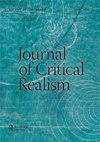The problem of evil and critical realism
IF 2.9
0 PHILOSOPHY
引用次数: 0
Abstract
ABSTRACT This paper applied the philosophical theory of critical realism to the problem of evil. Using the method of critical analysis of related literature, the paper discovered, among other things, that existing theodicies that are responses to the problem of evil can broadly be categorized into the compatibility thesis and the incompatibility thesis, respectively; and that the relevance of critical realism for the problem of evil lies in preserving a logical gap between the idea of the nature of ‘God as He really is, and how He is conceptualized or described by human theodicies’. The paper argued that whereas the thesis of the non-observability of the nature of God as He really is, independent of human cognition, conforms to critical realism, the non-observability of the omnibus does not. And to accommodate this, the novel concept of critical theism is proposed.恶与批判现实主义的问题
本文将批判现实主义的哲学理论应用于恶的问题。运用对相关文献的批判性分析方法,本文发现,除其他外,现有的作为对邪恶问题的回应的神学可以大致分为相容论和不相容论;批判现实主义与邪恶问题的相关性在于,在“上帝的本质”与人类神权如何概念化或描述他之间保留了一个逻辑鸿沟。本文认为,尽管独立于人类认知的上帝本质的不可观察性这一命题符合批判现实主义,但综合性的不可观测性却不符合。为了适应这一点,提出了批判有神论的新概念。
本文章由计算机程序翻译,如有差异,请以英文原文为准。
求助全文
约1分钟内获得全文
求助全文

 求助内容:
求助内容: 应助结果提醒方式:
应助结果提醒方式:


